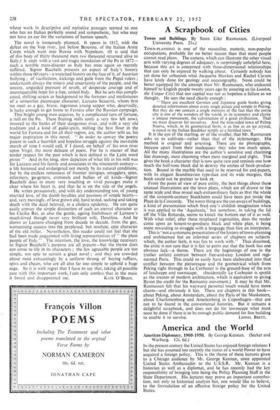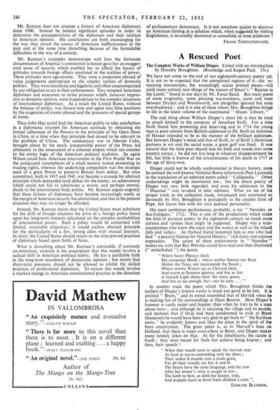America and the World
IN the present century the United States has enjoyed foreign relations I but she has assumed too recently the status of a world Power to have acquired a foreign policy. This is the theme of these lectures given to a Chicago audience by Mr. George Kerman, since appointed United States Ambassador to the U.S.S.R. Mr. Kennan is a historian as well as a diplomat, and he has recently had the key responsibility of bringing into being the Policy Planning Staff in the State Department. His lectures may prove an important contribu- tion, not only to historical analysis but, one would like to believe, to the formulation of an effective foreign policy for the United States. Mr. Kennan does not attempt a history of American diplomacy since 1900. Instead he isolates significant episodes in order to determine the presuppositions of the diplomats and their relation to American opinion. His conclusions are both encouraging for the way they reveal the causes of American ineffectiveness in the past and at the same time disturbing because of the formidable difficulties in the way of a remedy.
Mr. Kennan's examples demonstrate well how the fortunate circumstances of America's continental isolation gave her an exagger- ated sense of security which enabled her to afford the luxury of attitudes towards foreign affairs unrelated to the realities of power. These attitudes were ego-centric. They were a projection abroad of value judgements appropriate to the simpler verities of domestic politics. They were moralistic and legalistic and often unaccompanied by any obligation to act in their enforcement. They tempted American diplomats and statesmen to strike postures which, however impres- sive to domestic opinion, were inappropriate to the complex situations of international diplomacy. As a result the United States, without the balance of policy, was forced time and again into false positions by the exigencies of events abroad and the pressures of special groups at home.
Thus John Hay could lead the American public to take satisfaction in a diplomatic triumph for American rectitude by obtaining the formal adherence of the Powers to the principle of the Open Door in China at a time when that principle had ceased to be relevant to the problem of China. The unnecessary war to liberate Cuba, brought about by the newly irresponsible power of the Press, led ultimately to the annexation of a colonial empire which ran counter to the entire logic of the American political tradition. So again Wilson could base American intervention in the I4rst World War on the antiquated assumptions of a small neutral nation protecting its trading rights, whereas the underlying compulsion was the strategic need of a great Power to preserve Britain from defeat. But once committed, both in 1917 and 1941, war became a crusade for abstract principle which demanded total defeat for the enemy, an achievement which could not fail to administer a severe, and perhaps mortal, shock to the international body politic. Mr. Kennan argues cogently that these failures of diplomacy have become increasingly costly as the margin of American security has diminished, and that in the present situation they may no longer be afforded.
• Instead, Mr. Kennan insists that the United States must substitute for the drift of foreign relations the drive of a foreign policy based upon her long-term interests calculated on the complex probabilities of international power. Such a policy would be concerned with limited, attainable objectives ; it would eschew abstract principle for the particularity of a few, strong allies with mutual interests. In short, the United States should return to the time-proved practices of diplomacy based upon fields of force.
What is disturbing about Mr. Kennan's admirable, if curiously un-American, stoicism is his assumption that this would involve a radical shift in American political habits. He has a justifiable faith in the long-term soundness of democratic opinion ; but insists that short-term pressures should not be allowed to inhibit the skilled practices of professional diplomats. To ensure this would involve a marked change in American constitutional practice in the direction of parliamentary democracy. Is it not somehow qunint to discover an American hinting at a solution which, when suggested by visiting Englishmen, is invariably dismissed as unrealistic or even irrelevant ?
FRANK THISTLETHWAML



































 Previous page
Previous page